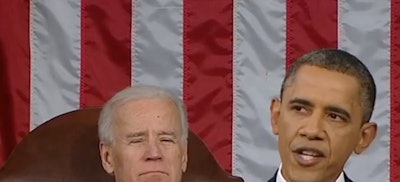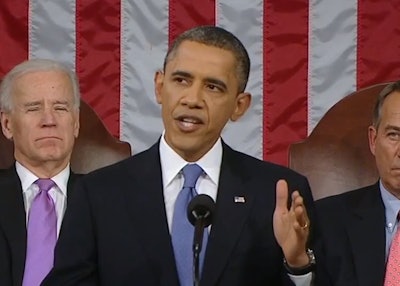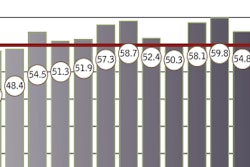

In his State of the Union address Tuesday night, President Barack Obama stressed the great importance of construction, housing, infrastructure, manufacturing and energy in creating new jobs and aiding the ongoing recovery of the American economy.
Obama spent several minutes of the address discussing the sad state of the country’s infrastructure, which he said is “badly in need of repair.” Recently, outgoing Transportation Secretary Ray LaHood put the sentiment a bit more bluntly, telling radio host Diane Rehm “America is one big pothole.”
The average age of the 600,000 bridges in the U.S. is 43 years. A great deal of these bridges are nearing the end of their 50-year life span. The estimated cost of repairing each deficient or obsolte bridge in the U.S. is $140 billion.
“Ask any CEO where they’d rather locate and hire. A country with deteriorating roads and bridges, or one with high speed rail and internet; high-tech schools, self-healing power grid,” Obama said.
The President mentioned the nearly 70,000 structurally-deficient bridges across the country and proposed what he called a “fix-it-first” program to employ workers as soon as possible to make the most urgent infrastructure repairs.
Rather than giving taxpayers the full burden of funding the program, Obama proposed a partnership that attracts private capital in order to partially fund these repairs and upgrades the country and the economy needs most.
“Modern ports to move our goods. Modern pipelines to withstand a storm. Modern schools worthy of our children,” Obama listed off. “Let’s prove that there’s no better place to do business than here in the United States of America and let’s start right away. We can get this done.”
Obama also addressed the “healing” housing market. He noted the “expanding” construction industry with home prices rising at their fastest pace in six years and sales up nearly 50 percent. However, Obama said — despite the lowest mortgage rates in nearly 50 years — the process of buying a home is currently holding this economic recovery back.
“Too many families with solid credit, who want to buy a home, are being rejected. Too many families who never missed a payment and want to refinance are being told no,” Obama said. “That’s holding our entire economy back. We need to fix it.”
Construction equipment manufacturer Caterpillar received a mention in Obama’s address, receiving kudos from the President for “bringing back jobs from Japan.” CAT announced last year that it was shifting assembly of its small bulldozers and mini hydraulic excavators from Sagami, Japan to Athens, Georgia.
CAT began hiring assembly line workers for the new plant in January and will hire more than 1,400 people over the next five years.
Obama said his administration’s first priority is “making America a magnet for new jobs and manufacturing,” noting that manufacturing has added more than 500,000 jobs in the U.S. in the last three years.
To encourage the continuation of that trend, Obama wants to expand a manufacturing innovation institute in Youngstown, Ohio into a network of 15 such hubs across the country. These hubs would stress high-tech training, skills and the development of such innovations as 3D printing.
However, Obama noted that expanding construction, housing and manufacturing will do little in the way of making meaninful contributions to the economic recovery without filling these returning jobs with skilled laborers.
In the construction industry, a labor shortage is feared by many. As demand has returned, crews have begun hiring again, but are badly in need of skilled workers. In November, the Construction Labor Market Analyzer forecasted a labor shortage of 2 million workers.
It’s largely based on the fact that between January 2007 and last year, 2.2 million workers left the industry. And USA Today estimates that 320,000 of them left for good — they’ve retired or begun working at what they consider more stable (though lower-paying) jobs such as truck driving or in a factory.
In addition to working to begin educating American children as early as possible by providing them with high-quality pre-schooling, Obama wants to “redesign” American high schools to ensure graduates leave ready to get to work in a high-tech economy.
Obama said high school students in Germany graduate with technical training equal to that given in community colleges here in the States. He also mentioned P-Tech, a high school in Brooklyn where students graduate not only with a high school diploma, but also an associates degree in computers or engineering.
“We need to give every American student opportunities like this,” Obama said. “We have to make sure that America remains a place where everyone who’s willing to work — everybody who’s willing to work hard — has the chance to get ahead.
Emissions, climate control and energy were also a big part of the State of the Union Address. The President said he would like to use oil and gas revenues to fund an energy security trust “that will drive new research and technology to shift our cars and trucks off oil for good.”
“Let’s…free our families and businesses from the painful spikes in gas prices we’ve put up with for far too long,” he said.
Obama said though carbon emissions have fallen over the past four years, he wants to “do more to combat climate change.”
Obama gave no specifics on what he is prepared to do, though the job of carrying those plans out would lie with the EPA. For right now, that agency needs some time to get itself back in order. EPA administrator Lisa Jackson resigned from her post in December and her successor has not yet been named.
“Now, it’s true that no single event makes a trend. But the fact is that the 12 hottest years on record have all come in the last 15. Heat waves, droughts, wildfires, floods all are now more frequent and more intense,” Obama said. “We can choose to believe that Superstorm Sandy, and the most severe drought in decades, and the worst wildfires some states have ever seen were all just a freak coincidence. Or we can choose to believe in the overwhelming judgement of science and act before it’s too late.”
The President urged lawmakers to pursue a bipartisan market-based solution for climate change and vowed to act if they would not. “I will direct my cabinet to come up with executive actions we can take now and in the future to reduce pollution, prepare our communities for the consequences of climate change and speed the transition to more sustainable sources of energy,” he said.
Beyond improving air quality, Obama noted that there is the potential for serious job creation in clean energy that has largely been dominated by other countries — though the U.S. is slowly changing that.
Natural gas received a mention in the address as well. The “natural gas boom,” Obama said, “has led to cleaner power and greater energy independence.” Obama said his administration will continue speeding up oil and gas permits and work to encourage research and technology that enables natural gas
to “burn even cleaner.”
Obama briefly mentioned sustainable building as well. He named the goal of cutting energy wasted in homes and businesses by half over the next 20 years. “We’ll work with the states to do it,” Obama said. “Those states with the best ideas to create jobs and lower energy bills by constructing more efficient buildings will receive federal support to help make that happen.”









